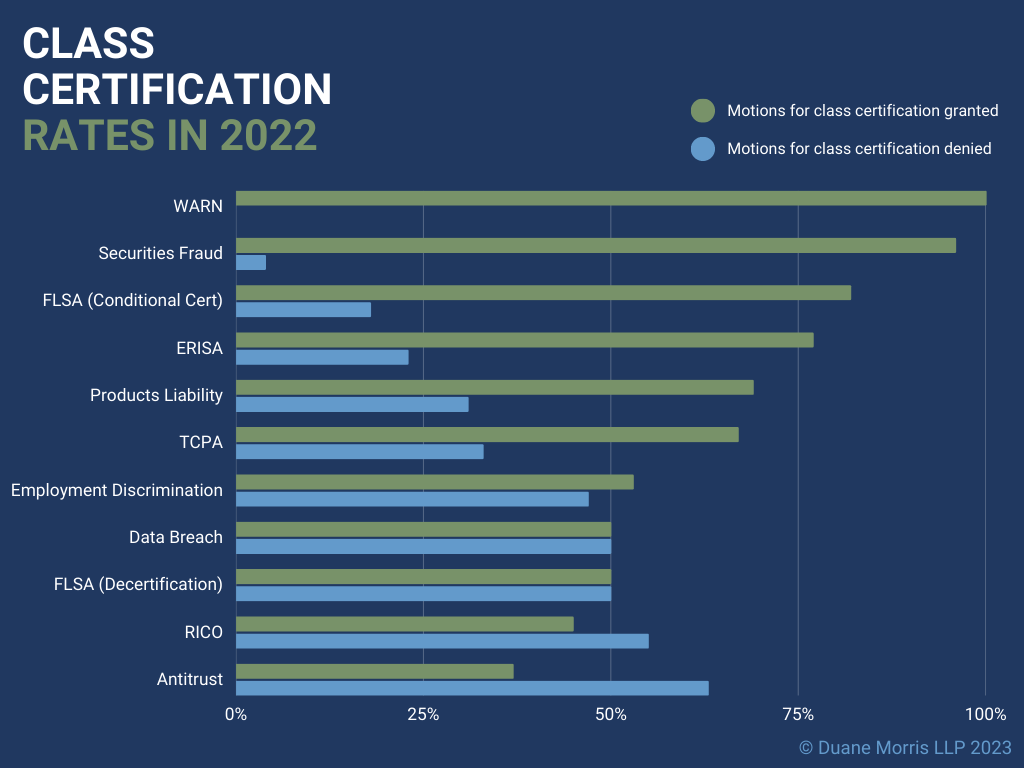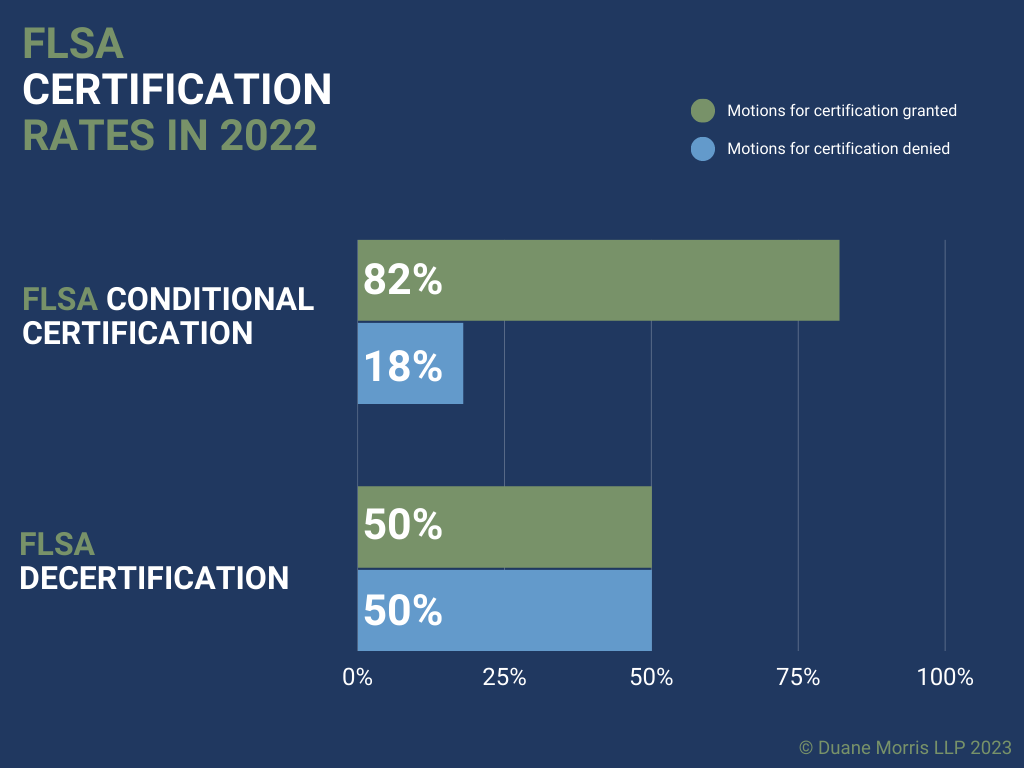 By Katelynn Gray, Gerald L. Maatman, Jr., and Gregory Slotnick
By Katelynn Gray, Gerald L. Maatman, Jr., and Gregory Slotnick
Duane Morris Takeaways: On April 12, 2023, Judge Ann M. Donnelly of the U.S. District Court for the Southern District of New York denied class certification in an employment discrimination class action brought by a former Auto Mechanic of the Fire Department of New York (FDNY). In Feeley v. New York Fire Department, Case No. 20 Civ. 1770 (S.D.N.Y. April 12, 2023), the plaintiff sued on behalf of a class consisting of all female employees that have or will be employed with the FDNY since August 2007 who have the need or chose to express milk during work hours. On Rule 72 review, in adopting Magistrate Judge Peggy Kuo’s report and recommendation in its entirety, Judge Donnelly determined that the plaintiff was unable to demonstrate that the FDNY discriminated against other female employees pursuant to an alleged policy or practice of failing to provide them with reasonable work assignment accommodations, adequate lactation locations, or notice of their rights. The Court opined that the plaintiff failed to meet the Rule 23 requirements of commonality and typicality, and that her attorneys could not sufficiently provide adequate class representation. The ruling is a blueprint for corporate counsel in terms of a solid approach for opposing employment-related class action certification motions.
Background
The plaintiff, an ex-FDNY Auto Mechanic claimed that, after she returned from maternity leave in July 2018 and told a supervisor she would need to express breast milk in the workplace, she was first provided an unoccupied office to lactate twice a day for 30 to 45 minutes. However, according to the Complaint, beginning in September 2018, she experienced various workplace issues interfering with her ability to express breast milk.
First, the plaintiff asserted that the FDNY made her fill out a form and told her she had to create a schedule in advance of when she needed to express milk, subject to supervisor approval. She also claimed she was forced to “parade” in front of her co-workers while pumping in order to clock out with breast pump apparatus still attached, had to pump from multiple locations included her vehicle and a cubicle, and that she was not provided reasonable work assignment accommodations conducive to her physical limitations to ensure her legal right to pump. The former employee also alleged that the FDNY began to closely monitor her work, and gave her negative performance evaluations and difficult assignments as a form of harassment and retaliation after she complained about her treatment in the workplace.
According to Magistrate Judge Kuo’s opinion, the FDNY provided evidence it had a formal lactation policy since 2010 that guaranteed nursing employees the right to take lactation breaks in a clean and private space other than a bathroom and in close proximity to their workstation, as required by law. The FDNY also provided yearly training to its employees regarding reasonable accommodations and its Human Resources Department provided employees returning from childbirth with information on their right to express breastmilk in the workplace. The FDNY further distributed an application for employees to request reasonable lactation-related accommodations. Between January 2010 and March 2021, 269 FDNY employees applied to express breast milk at work, 91 employees requested lactation accommodations, and all requests for accommodation were granted. The plaintiff was the only FDNY Auto Mechanic who requested a lactation accommodation during that time period.
The Decision
First, Magistrate Judge Kuo found the plaintiff failed to demonstrate commonality with respect to her allegation that the FDNY did not provide reasonable accommodations related to work assignments. Specifically, the Court determined that the plaintiff did not articulate what requests for accommodations she made and in what way they were denied. The Court held that even if the FDNY discriminated against the employee by failing to provide her reasonable accommodations, there was no evidence of any widespread policy or practice that the FDNY discriminated against nursing mothers by denying them reasonable work assignment accommodations. The Magistrate Judge concluded that the plaintiff’s description of a single assignment she claimed was harassing (repair of a vehicle that was soon to be condemned) failed to describe a policy or widespread FDNY practice, and was unique to the employee. Magistrate Judge Kuo also found the employee failed to allege any other nursing mother at the FDNY faced similar discrimination, and that she had actually testified she was unaware of any such instance
The Court found the FDNY notified the employee of her lactation rights, and indeed the employee filled out a form requesting two specific times during the workday to express breast milk. According to Magistrate Judge Kuo, even assuming the employee was discriminated against because she received inadequate notification of her rights, the plaintiff failed to show a widespread pattern or practice of pervasive discrimination against the putative class, that the FDNY engaged in widespread acts of intentional discrimination, or that intentional discrimination was the FDNY’s standard operating procedure.
As to typicality, the Court held the plaintiff’s claims were specific to her and atypical of her proposed class, as she was the only female Auto Mechanic in the Fleet Services Division. She also failed to provide any information about other employees’ experiences in connection with her motion.
Finally, the Court took issue with the ability of Plaintiff’s counsel to adequately represent the putative class. It noted that plaintiff’s counsel had missed various deadlines and conferences in the case. The attorneys further failed to attach affidavits or any statistical analysis to the motion papers, which raised red flags for the Court as to the firm’s competency to represent the putative class.
Key Takeaways for Employers
In addition to a roadmap for opposing class certification in an employment discrimination claim, the decision is a timely reminder for employers to ensure they have policies and practices in place that comply with federal, state, and local laws and regulations concerning employees’ right to express breast milk at work. For example, effective June 7, 2023, for employers throughout New York State, employees must have access to lactation rooms or spaces that meet certain specifications. Specifically, the room must be: (i) “in close proximity to the work area”; (ii) “well lit”; (iii) “shielded from view”; and (iv) “free from intrusion from other persons in the workplace or the public.” Additionally, the room must be supplied with: (i) “a chair”; (ii) “a working surface”; (iii) “nearby access to clean running water”; (iv) “an electrical outlet,” if the workplace has electricity; and (v) “refrigeration for the purposes of storing the expressed milk,” if there is access to refrigeration in the workplace. The room may not be a restroom or toilet stall. New York employers also will need to provide reasonable unpaid break time or permit an employee to use paid break time or meal time to allow an employee to express breast milk for her nursing child each time such employee has reasonable need to express breast milk for up to three years following child birth. New York employers will also be required to provide the NY Department of Labor’s written policy regarding the rights of nursing employees to express breast milk to each employee upon hire and annually thereafter, as well as to employees returning to work following childbirth.
At the federal level, a fairly recent Duane Morris Alert details expanded protections for pregnant and nursing employees. The Alert also provides suggested steps employers should take to comply with new requirements under the PUMP for Nursing Mothers Act (enforcement effective April 28, 2023) and the Pregnant Workers Fairness Act (effective June 27, 2023).










